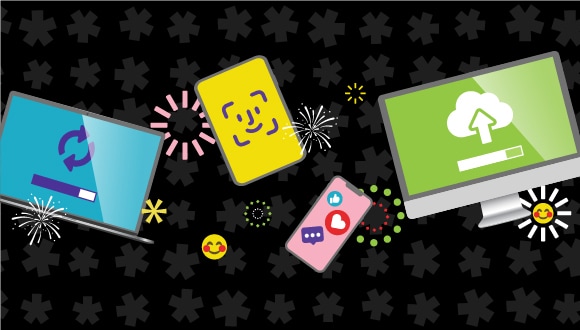The New Year is the perfect time for resolutions and new goals, but there's one thing you likely don't want to reinvent – your identity! Online identity theft occurs when a cyber criminal steals your personal information. This could include your social insurance number, banking information and other sensitive details. As you plan for the year ahead, focus on protecting your identity.

Secure your devices
Your devices hold a lot of your personal information. From tablets and gaming systems to smart phones and watches, each one of your devices needs to be protected. One of the easiest and most effective ways to make sure they're secure is to update them regularly. You can even enable automatic updates, so you don't have to remember to do it manually. These updates provide essential security fixes to the software on your devices that help protect you from new threats. It's important to regularly update the apps on all your devices, too.
You should also back up your important files and information. This ensures that your data, special photos, personal files and other documents will always be protected if your device gets lost, stolen or compromised. You can perform backups by using cloud storage, an external hard drive or other external storage options like USB keys. We recommend using two different storage devices for extra security and peace of mind.
Protect your accounts
Your online accounts contain a lot of personal information. That's why securing them should be a priority. Here are a few things you can do to make sure they're protected.
Make strong passphrases or passwords that are unique. Passphrases should be at least 15 characters long and include four or more random words, numbers and symbols. Passwords should be at least 12 characters long and include numbers, symbols and upper-and-lower-case letters. You can use a password manager to help create and store all your unique passwords and passphrases, so you don't need to memorize all of them.
Add an extra layer of security to your accounts by enabling multi-factor authentication (MFA). MFA requires an additional step when you log in to verify your identity, like a code sent to your phone, a biometric like a thumb print or even something physical like a token.
Secure your socials. Social media is a fun way to share content online, but sharing too much information about yourself can leave your accounts vulnerable to cyber threats. Avoid sharing sensitive information online that could be used to verify your identity when trying to access your accounts (SIN, home address, phone number). You should never use personal details that you post about online (like your favourite hockey team or your pets name) in passwords, passphrases or security questions. It's better to secure your social media accounts by customizing your security settings by limiting who can see your posts, making your accounts private and blocking people you don't know.
Conclusion
As you set your goals for the New Year, make sure improving your cyber security is part of them. Securing your devices and accounts means you're taking important steps to protect your identity!